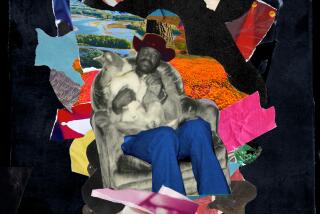Review: Andra Day burns hot and cool as jazz great in ‘The United States vs. Billie Holiday’
- Share via
Starting with its title, there is no shortage of conflict in “The United States vs. Billie Holiday,” director Lee Daniels’ dispiriting portrayal of the federal government’s targeted pursuit of the great jazz singer from 1947 until her death in 1959 at the age of 44.
Referring to the notorious 1947 court case that landed her in prison for a year on a narcotics possession charge at the height of her career, Holiday reportedly said, “It was called ‘The United States of America versus Billie Holiday,’ and that’s just the way it felt.”
Based on a chapter from British journalist Johann Hari’s 2015 book “Chasing the Scream: The First and Last Days of the War on Drugs” and written by Pulitzer-winning playwright Suzan-Lori Parks (“Topdog/Underdog”), the movie takes its cues from the actions of Federal Bureau of Narcotics Commissioner Harry J. Anslinger (Garrett Hedlund). His obsession with Holiday as a threat to national security is near pathological and fuels his agency’s relentless persecution of the singer that drives the film’s plot.
“Billie’s” fiery energy, however, comes from a searing central performance by singer Andra Day (“Rise Up”) as the woman colloquially known as Lady Day. That fire is required to burn through an at-times clunky episodic structure that drags the movie from scene to scene with supporting characters dropping in and out as the Feds close in and Holiday is exploited, abused and betrayed by one man after another. In their unstinting and graphic depiction of the singer’s drug addiction and harrowing early life, however, Daniels and Parks endeavor to position her as a survivor and pioneering civil rights activist, not a victim.
The Feds, still licking their wounds after Prohibition ended in 1933, had moved on from marijuana to opiates as their cudgel of choice. Anslinger’s “war on drugs” was more of an assault on the rights of Black people, with narcotics merely a weaponized excuse for race-driven attacks that made America’s cities every bit the battlefield as the Deep South. In Holiday, Anslinger found a high-profile mark who, despite her vulnerabilities, proved remarkably resilient against their attempts to take her down.
What made Holiday so “dangerous” in Anslinger’s eyes was, of course, not the drugs, but her absolute refusal to stop performing the proto-civil rights anthem “Strange Fruit.” The Feds feared the protest song against lynching, with its stinging opening lines, “Southern trees bear a strange fruit/Blood on the leaves and blood at the root,” would sow discontent among Black Americans — as opposed to being enraged by the segregationist Jim Crow laws that discriminated and disenfranchised them. (Though written by a New York City teacher named Abel Meeropol under a pseudonym, “Strange Fruit” drew its lasting power from Holiday’s husky, unhurried delivery and emotional phrasing.)
In the film, Anslinger is little more than a two-dimensional villain repping a system of prejudice and vile nationalism unleashed in the name of patriotism. As in the more nuanced but equally timely “Judas and the Black Messiah,” the Feds deploy a Black man to infiltrate and betray the world of a figure whose truth frightens them.
Despite the relatively integrated nature of jazz clubs, white agents have little chance of fitting in so Aslinger taps the ambitious young Jimmy Fletcher (Trevante Rhodes of “Moonlight”) to get close to Holiday. Initially, the straight-shooter has no qualms about the work he is doing, including setting the singer up in a drug sting, but his stance eventually softens and, yielding to her charms, becomes something like a love interest, one that Holiday doesn’t think she deserves.
Raped and forced into prostitution at a young age, Holiday turned to drugs as a way to kill the pain and developed an almost masochistic talent for coupling with men who would torment her. Erik LaRay Harvey, Tone Bell and Rob Morgan appear as a few of the men who did her wrong, but only Morgan, as Holiday’s cruel husband Louis McKay, sticks around long enough to make an impression.
Lady Day’s romantic involvement with other women is given fleeting attention via an affair with Tallulah Bankhead (an underused Natasha Lyonne) that primarily serves to illustrate Holiday’s indignation over being told to take a service elevator by a Black operator. Da’Vine Joy Randolph and Miss Lawrence provide some auxiliary sass as Roslyn and Miss Freddie, respectively, Holiday’s loyal confidantes and stylists.
In Lee Daniels’ ‘The United States vs. Billie Holiday,’ the ‘Rise Up’ and ‘Burn’ singer summons the singular style of an icon.
Notably preceded in portraying Holiday by Diana Ross in 1972‘s “Lady Sings the Blues” and Audra McDonald in the 2014 Broadway revival of “Lady Day at Emerson’s Bar and Grill” (later filmed for HBO), Andra Day makes the role hers . Eschewing impersonation, Day carves out a distinctive interpretation, including a full-throated vocal performance that injects the musical numbers with excitement and pathos. Day also fills her dramatic scenes with a smoldering rage and sadness, inhabiting Holiday in a way that holds the film together.
It’s interesting that the talents of Ross, McDonald and Day all eclipse the productions they star in. It may be that Holiday is too large a persona to be captured in a single story with the multitude of conflicts competing for dramatic attention.
In “The United States vs. Billie Holiday,” there is a struggle over how to tell that story. Within the confines of a straight-ahead, handsomely designed and photographed biopic beats the heart of a more adventurous presentation of Holiday’s tragic life. It’s hinted at in Day’s performance, the dreamlike memory sequences and a cheeky, meta-coda that plays out during the end credits but never quite pierces the film’s more varnished surfaces.
‘The United States vs. Billie Holiday’
Not rated
Running time: 2 hour, 10 minutes
Playing: Available Feb. 26 on Hulu
More to Read
Only good movies
Get the Indie Focus newsletter, Mark Olsen's weekly guide to the world of cinema.
You may occasionally receive promotional content from the Los Angeles Times.












